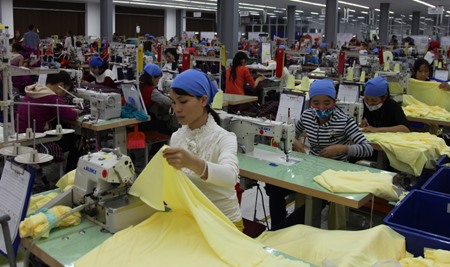 Society
Society

Strong social dialogue, better working conditions and improved productivity will define economic progress in Việt Nam, as it enters a new era of global integration.
 |
| Workers make clothes for export at the Gián Khẩu Industrial Zone in Gia Viễn District, the northern province of Ninh Bình. — Photo baoninhbinh.org.vn |
HÀ NỘI — Strong social dialogue, better working conditions and improved productivity will define economic progress in Việt Nam, as it enters a new era of global integration.
This is the main message that came out of a conference in Hà Nội, jointly organised by the State Secretariat for Economic Affairs of Switzerland (SECO), the International Labour Organization (ILO) and the Ministry of Labour, Invalids and Social Affairs (MoLISA), yesterday.
“Within a generation, Việt Nam has transformed itself from one of the most isolated economies to one of the most connected ones, through various free trade agreements,” said director of ILO Việt Nam Chang-Hee Lee.
While acknowledging the benefits an open economy can offer in terms of investment, opportunities in global markets and job creation, he warned of the accompanying risks - as enterprises face tougher competition, workers and their families are more exposed to the volatility of global market forces.
“For an open economy to remain competitive while ensuring a stable livelihood for its working population, it requires an environment for sustainable enterprise development and resilient labour market institutions to mitigate the negative impact of external shocks on the lives of working women and men,” Lee said.
The Trans-Pacific Partnership (TPP) and EU-Việt Nam Free Trade Agreement (EVFTA), which Việt Nam has signed, require reforms in labour code and industrial relations to comply with the 1998 ILO Declaration on Fundamental Principles and Rights at Work. “It is a challenge,” Lee said.
Other concerns include the middle income trap that Việt Nam has been warned about – the country may not be able to move beyond labour intensive-manufacturing, with little added value, and low wages for its unskilled workforce.
Swiss Ambassador to Việt Nam Beatrice Maser Mallor said, “Given that context, strengthening social dialogue, enhancing productivity and improving working conditions are critically important to (be able to) respond to the requirements of globalised production processes, and, ultimately, to contribute to sustainable and inclusive economic growth.”
Boris Zürche, head of Swiss Labor Directorate, agreed. “Switzerland’s experience shows that strong social dialogue is essential for the prosperity of a country. Together, workers’ and employers’ organisations can find tailored solutions to improve working conditions, increase productivity and assure the competitiveness of the economy.”
Doãn Mậu Diệp, Deputy Minister of Labour, Invalids and Social Affairs, said it was “the right time” for the government, together with ILO, business communities, workers’ organisations and other partners, to review the country’s legal and institutional framework and improve productivity and working conditions, and to design and implement more effective policies in this area. — VNS




